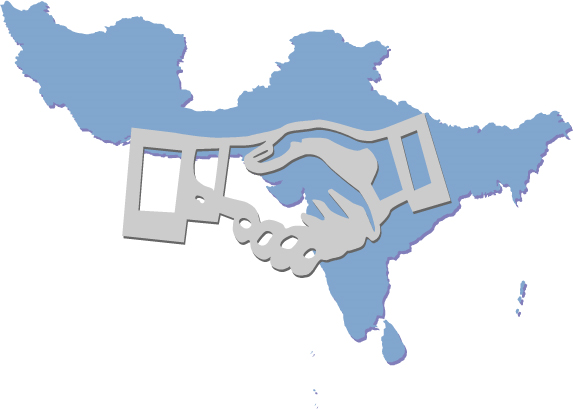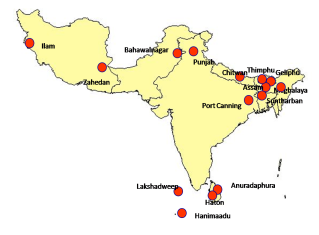Climate Change
Malé Declaration on Control and Prevention of Air Pollution and Its Likely Transboundary Effects for South Asia

ABOUT Air pollution is an emerging environmental issue in Asia as it is in other parts of the developing world. In particular, emissions of sulphur dioxide and nitrogen oxides have been rising steadily over the past few decades. In addition, rapid growth of cities, together with associated expansion of industry and transport systems, has made the Asian region increasingly concerned with these emissions. Projections indicate that at the current growth rate of energy consumption, sulphur dioxide emissions in Asia will surpass the combined emissions of Europe and North America. If this occurs, the impact, which has been experienced in Europe and North America over this century, will become apparent in parts of Asia over the next few decades. The ‘Malé Declaration on Control and Prevention of Air Pollution and its likely Transboundary Effects for South Asia is an intergovernmental network involving Bangladesh, Bhutan, India, Iran, the Republic of Maldives, Nepal, Pakistan and Sri Lanka. The Seventh meeting of the Governing Council of SACEP, held in April 1998 in Malé, the Republic of Maldives, adopted the Declaration. The declaration emphasizes the need for countries to carry forward, or initiate, studies and programmes on air pollution in each country of South Asia.
IMPLEMENTATION
The implementation of the Malé Declaration was envisaged in phases and , Phase I, II and III was implemented successfully by UNEP in partnership with SACEP with the financial support from SIDA. Phase IV(2010-2014 continued to assist the member countries enhance their regional cooperation, monitoring, impact assessment; strengthen the initiatives started in the first three phases and to initiate new ones. And the current stage, Phase V (2014-2016) aims to promote policy measures to control emissions of air pollution including Short-Lived Climate Pollutants (SLCPs) in South Asia and to ensure the sustainability and ownership of the Malé Declaration in the region .
ACTIVITIEES
Read More

Brief on the Malé Declaration on Control and Prevention of Air Pollution and Its Likely Transboundary Effects for South Asia

With increasing urbanization and economic growth, and having a quarter of the world’s population, air pollution is an increasing concern in South Asian countries. Understanding the environmental impacts that may be created due to Air Pollution and transboundery effects, the Governing Council of South Asia Co-operative Environment Programme (SACEP) agreed on a joint programme of work. This initiative led to the adoption of the ‘Malé Declaration on Control and Prevention of Air Pollution and Its Likely Transboundary Effects for South Asia (MD)’ at the Seventh Governing Council meeting of SACEP held in Male, Maldives in April 1998. Together with UNEP, this initiative was funded by the Swedish International Development Cooperation Agency (SIDA) as part of the Regional Air Pollution in Developing Countries (RAPIDC) programme. It is the only inter-governmental agreement of its kind covering the eight countries involved and the participating countries in this programme are Bangladesh, Bhutan, India, Iran, Maldives, Nepal, Pakistan and Sri Lanka. Country Governments nominated National Implementing Agencies (NIAs) for the implementation of the MD. UNEP RRC.AP hosts the Secretariat up to Phase IV. The implementation is now in Phase V under RRCAP/AIT.
Phase I: 1999-2001
An intergovernmental network was established which governs the MD activities. After Phase I, all the participating countries completed baseline studies and action plans. The baseline studies provided valuable information on air pollution management programmes in the participating countries and clearly identified the gaps in the existing monitoring systems to understand transboundary air pollution.
Phase II: 2001-2004
- A capacity building programme was initiated in Phase II which included strengthening the monitoring network and training.
- National and regional level stakeholders’ consultations were held during this phase(With the completion of Phase II, all the participating countries had established one transboundary air pollution monitoring station and the required skilled manpower to do the monitoring.)
- The institutional structure was developed and local capacities in monitoring local and transboundary air pollution had been increased.
- Developed a common methodology, to train technical staff, strengthen monitoring stations and establish scientific and stakeholder networks.
Phase III: 2005-2008
- Continued the capacity building for monitoring initiated during Phase II.
- Capacity building for impact assessment and prevention of air pollution was initiated
- The regional network development was strengthened.
- During Phase III four Intergovernmental Meetings and four Regional Stakeholders cum Regional Coordination meetings and national stakeholder meetings of the MD took place.
- Capacity on monitoring programme was strengthened though regular regional and national training programme and others activities.
- A passive sampler Inter-comparison programme and two inter laboratory comparison programmes were conducted for quality assurance and control.
- Monitoring of ozone O3 was included as an additional parameter.
- The emission inventory manual and workbook were continuously improved during Phase III.
- An epidemiological study looking into the impacts of particulate matter on asthmatic schoolchildren was successfully undertaken in Bangladesh.
- Three publications ‘Past, Present and Future’ of Malé Declaration; ‘Good Practices on Prevention and Control of Air Pollution: A Compendium’ and ‘Youth for Clean Air Compendium’ were published.
- An interactive ‘Youth for Clean Air’ CD for youth which contained 4 modules on understanding atmospheric emissions, their sources, impacts and measures to reduce the atmospheric emissions was developed.
- Bangladesh NIA developed a DVD on ‘No to Air Pollution, it’s Time to Go Healthy’ as a part of the public awareness campaign.
- In addition, the countries and their representatives were kept updated through the quarterly newsletters and the development of MD brochures.
Phase IV 2010-2013
- Continued to assist the member countries enhance their regional cooperation, monitoring, impact assessment; strengthen the initiatives started in the first three phases and to initiate new ones.
- The implementation followed the institutional arrangement of the MD, which was adopted in IG8 Meeting.
- A Task Force on Future Development (Task Force) of the MD was established to consider important aspects of the expanding network such as the development of regional technical centres; development of a regional framework agreement between countries regarding atmospheric emissions of air pollutants; and establishment of a Sustainable Financing Mechanism for the MD.
- The First Meeting of the Task Force held on 2-3 August 2010 in Thailand, agreed that ;
- a mechanism for sustainable financing to be developed;
- a feasibility study on establishing regional centers to be conducted; and
- a feasibility report on strengthening the regional framework on air pollution reduction in South Asia to be conducted.
- Progress on the above were reviewed and discussed during the Second Meeting of the Task Force which was held in Colombo, Sri Lanka, on 29-30 November 2010.
- The Third meeting of the Task Force was held in August 2012 in Chonburi, Thailand.
- During the Phase IV, NIAs continued the operation of the monitoring sites through addition of 4 new sites in India and one new site in Iran.
- The Ninth Refresher Training on Monitoring Transboundery Air Pollution was held in, New Delhi India in 2012, to provide hands-on training on the use of different monitoring and laboratory equipment and enhanced knowledge on quality assurance / quality control aspects.
- A workshop on Health Impact Assessment was held in Dhaka, Bangladesh in January 2012 and A National ‘Youth for Clean Air Awareness Workshop’ was held in Dhaka, Bangladesh.
- Regional Workshop on ‘Youth for Clean Air’ was held in February 2012 in Ahmedabad, India.
- The Fifth Training on Emission Inventory and the National Training on Emission Inventory of the Malé Declaration on Control and Prevention of Air Pollution and Its Likely Transboundary Effects for South Asia (Malé Declaration) was held in Colombo, Sri Lanka in May 2012
- Seventh Regional Stake-Holders Meeting cum Coordination Meeting (RSC7) and the Thirteenth Session of the Intergovernmental Meeting (IG13) of the Malé Declaration on Control and Prevention of Air Pollution and its Likely Transboundary Effects for South Asia was held in May 2013 in Dhaka, Bangladesh(At the meeting the Draft Plan for Phase V was presented)
- In 2013, an independent evaluation was conducted on the implementation of the Malé Declaration. Following is the summery of the evaluation on the implementation of the Malé Declaration over a period of 1998-2012
Malé Declaration by its evolution path had been serving the purpose of providing the lead at regional level to address the transboundary issue of air pollution in South Asia and hence need to continue in future.
Phase V 2014- 2016
Phase V aims to promote policy measures to control emissions of air pollution including short-lived climate forces in South Asia and to ensure the sustainability and ownership of the Male Declaration in the region.
- Develop source specific protocols and guidance to control emissions of air pollutants
- Strengthening the impact assessments (Health/Crop/Corrosion)
- The National Stakeholders Workshop on Health Impact Assessment of Air Pollution on Male Declaration held in Dhakha, Bangladesh on 15th October 2014
- Cooperation and Coordination with other Initiatives and Programmes:
- Participated at the High Level Sub-regional Consultation on advancing Action on short –lived Climate Pollutants (SLCPs) in Southeast and Northeast Asia on 19 August 2014, in Bangkok, Thailand.
- Participated at the Consultation Meeting of the Joint Form on clean Air in Asia and the Pacific and the Fifth Governmental meeting on Urban Air Quality in Asia that was held in Colombo, Sri Lanka in November 2014.
- Conduct awareness programmes among policy makers, stakeholders, and youths
- Implementation of the activities of the regional technical centers and enable them to conduct studies and communicate the results to policy makers and stakeholders
- Convened the meetings of the Fourth Task Force on Future Development of Male Declaration in Bangkok, Thailand in May 2015 to discuss the future development of Male Declaration including the source specific protocols and guidelines,
- The Intergovernmental Meeting is scheduled to be held in November 2015 to review the progress and make decisions on further implementation including the source specific protocols and guidelines
Click here for more information
Click here for Malé Declaration Reports
